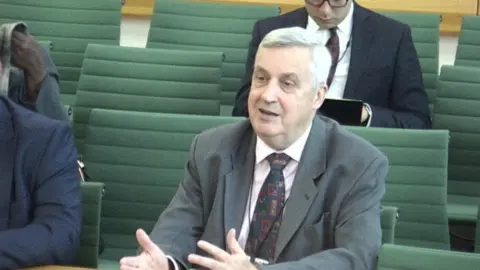Asylum applications: Home Office urged to use lie detectors
 PA
PAPeople seeking asylum in the UK should take a lie detector test as part of their application, the former chief of UK immigration enforcement says.
Abuse of the asylum system is "rife" and it is being used by economic migrants, according to David Wood.
In a report, he said new technology would help spot "signs of deception".
It comes after Home Secretary Sajid Javid questioned whether some migrants crossing the Channel were genuine asylum seekers.
There has been a small spike in crossings to Britain in recent months, and in December Mr Javid declared the increase a "major incident".
The Home Office said it is not considering using lie detectors in asylum cases.
Mr Wood was the deputy chief executive of the Border Agency and later the director general of immigration and enforcement at the Home Office, before retiring in 2015.
He wrote the report - published on Friday - for independent think tank Civitas: Institute for the Study of Civil Society.
In the report, he says the current system is being used to "facilitate economic migration" - with up to 15,000 asylum applications every year from people who ultimately have no valid claim.
'Get to the truth more quickly'
He suggests one way of distinguishing genuine refugees from others would be to use automated technology to screen applications.
The 20-minute screening technology - which the report says has accuracy rates of 90% - would highlight "questionable" answers, so interviewers can "focus on those areas".
"It would not be about proving that the applicant is lying, but about being reasonably confident that they are telling the truth," he adds.

"That could save a lot of time, enabling caseworkers to get to the truth more quickly."
The Home Office - which said it is not considering using lie detectors - said its staff are "rigorously trained" to make consistent and high-quality decisions.

Analysis
By Danny Shaw, BBC home affairs correspondent
Many people will baulk at the idea of using technology to determine whether asylum seekers are telling the truth or not.
Thousands of those who arrive on our shores every year have fled appalling abuse and persecution - and in some cases torture.
It would be heartless and cruel, the argument goes, to require them to submit to a mechanical process of lie detection.
But polygraph testing is widely used, mainly by law enforcement, in other countries - and since 2014 it's been deployed by probation officers in England and Wales to determine whether convicted sex offenders are complying with their licence conditions.
It would be a major step for that to be extended to the asylum system - but the debate has started.

How does someone seek asylum?
If someone wants to stay in the UK as a refugee, they must have left their country and be unable to go back because of a fear of persecution, the government says.
They should apply when they arrive in the UK or as soon as they think it would be unsafe to return to their home country.
After they have made an application, they will go to a "screening" - a meeting with an immigration officer - where they will be asked why they want asylum.
Following that, they will undergo an interview during which they are asked to explain and show evidence of how they were persecuted in their home country and why they are afraid to go back.
A decision will usually be made within six months, the government says.

